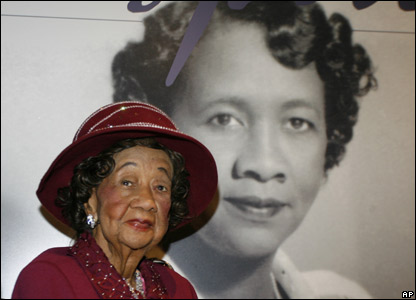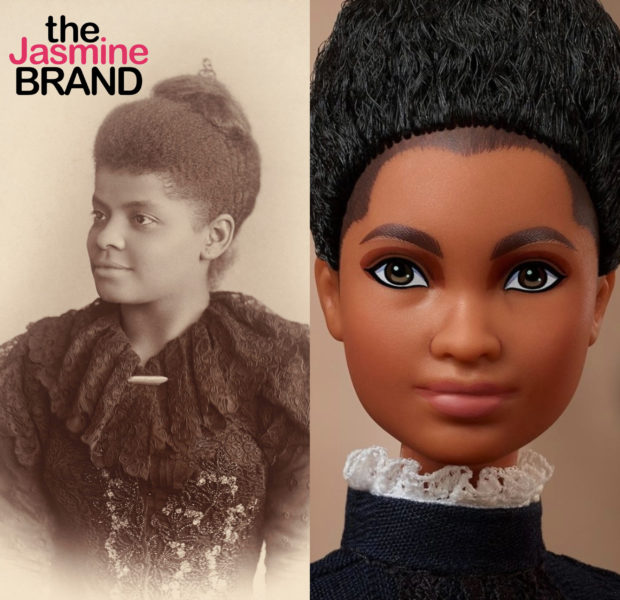The Life of Dorothy I. Height
“A Negro woman has the same kind of problems as other women, but she can’t take the same things for granted.” Dorothy Height
Early this morning, a local and national living legend, Dorothy I. Height, passed at 98. Via Washingtonpost: Dorothy I. Height, 98, a founding matriarch of the American civil rights movement whose crusade for racial justice and gender equality spanned more than six decades, died early Tuesday morning, a spokesman for Howard University Hospital said.
The spokesman, Ron Harris, said Ms. Height died at 3:41 a.m. No cause of death was given.
Ms. Height was among the coalition of African American leaders who pushed civil rights to the center of the American political stage after World War II, and she was a key figure in the struggles for school desegregation, voting rights, employment opportunities and public accommodations in the 1950s and 1960s.
She was president of the National Council of Negro Women for 40 years, relinquishing the title in 1997. The 4 million-member advocacy group consists of 34 national and 250 community-based organizations. It was founded in 1935 by educator Mary McLeod Bethune, who was one of Ms. Height’s mentors.
As a civil rights activist, Ms. Height participated in protests in Harlem during the 1930s. In the 1940s, she lobbied first lady Eleanor Roosevelt on behalf of civil rights causes. And in the 1950s, she prodded President Dwight D. Eisenhower to move more aggressively on school desegregation issues. In 1994, Bill Clinton awarded her the Presidential Medal of Freedom, the nation’s highest civilian honor.
In the turmoil of the civil rights struggles in the 1960s, Ms. Heights helped orchestrate strategy with movement leaders including the Rev. Martin Luther King Jr., Roy Wilkins, A. Philip Randolph, Whitney Young, James Farmer, Bayard Rustin and John Lewis, who later served as a Democratic member of the U.S. House of Representatives from Georgia.
Ms. Height was arguably the most influential woman at the top levels of civil rights leadership, but she never drew the major media attention that conferred celebrity and instant recognition on some of the other civil rights leaders of her time. Here for the full story. Photo Source.



 Previous Article
Previous Article Next Article
Next Article![Drake Trolls Rory’s Absence From ‘The Joe Budden Podcast’ [VIDEO]](https://thejasminebrand.com/wp-content/uploads/2021/04/IMG_5792.jpg) Drake Trolls Rory’s Absence From ‘The Joe Budden Podcast’ [VIDEO]
Drake Trolls Rory’s Absence From ‘The Joe Budden Podcast’ [VIDEO]  Kim Kardashian – Study Claims Reality Star’s “Slim-thick” Figure Is More Harmful For Body Image
Kim Kardashian – Study Claims Reality Star’s “Slim-thick” Figure Is More Harmful For Body Image  Floyd Mayweather Claims He Witnessed Tupac Shakur’s Death In Recently Resurfaced Video: ‘I Ain’t Never Told Nobody’
Floyd Mayweather Claims He Witnessed Tupac Shakur’s Death In Recently Resurfaced Video: ‘I Ain’t Never Told Nobody’  Social Media Influencer “Hushpuppi” Sentenced To 11 Years In Prison Over Money Laundering Conspiracy
Social Media Influencer “Hushpuppi” Sentenced To 11 Years In Prison Over Money Laundering Conspiracy  Lil Wayne's Daughter Pops Off On Haters (via Twitter)
Lil Wayne's Daughter Pops Off On Haters (via Twitter)  NYC Male Photographer Receives Backlash For Charging $100 More To Shoot Plus-Size Models
NYC Male Photographer Receives Backlash For Charging $100 More To Shoot Plus-Size Models  Barbie Introduces Upcoming Ida B. Wells Doll As Part Of Their Inspiring Women Series
Barbie Introduces Upcoming Ida B. Wells Doll As Part Of Their Inspiring Women Series  Kanye West, Jay-Z, Diddy, Khloe Kardashian & A Handful Of A-List Celebrities Received Millions In PPP Loans
Kanye West, Jay-Z, Diddy, Khloe Kardashian & A Handful Of A-List Celebrities Received Millions In PPP Loans